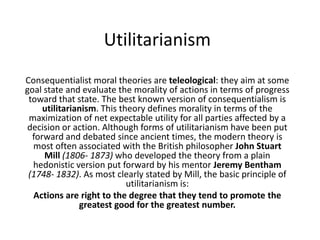
Utilitarianism
- 1. Utilitarianism Consequentialist moral theories are teleological: they aim at some goal state and evaluate the morality of actions in terms of progress toward that state. The best known version of consequentialism is utilitarianism. This theory defines morality in terms of the maximization of net expectable utility for all parties affected by a decision or action. Although forms of utilitarianism have been put forward and debated since ancient times, the modern theory is most often associated with the British philosopher John Stuart Mill (1806- 1873) who developed the theory from a plain hedonistic version put forward by his mentor Jeremy Bentham (1748- 1832). As most clearly stated by Mill, the basic principle of utilitarianism is: Actions are right to the degree that they tend to promote the greatest good for the greatest number.
- 2. 1. It is not always clear what the outcome of an action will be, nor is it always possible to determine who will be affected by it. Judging an action by the outcome is therefore hard to do beforehand. 2. It is very difficult to quantify pleasures for cost/benefit analysis (but since this only has to be done on a comparative scale, this may not be as serious an objection as it at first seems). 3. The calculation required to determine the right is both complicated and time consuming. Many occasions will not permit the time and many individuals may not even be capable of the calculations. 4. Since the greatest good for the greatest number is described in aggregate terms, that good may be achieved under conditions that are harmful to some, so long as that harm is balanced by a greater good. 5. The theory fails to acknowledge any individual rights that could not be violated for the sake of the greatest good. Indeed, even the murder of an innocent person would seem to be condoned if it served the greater number.
- 3. A system of rules would help with the other objections, however, even if they only serve as convenient advice. They would codify the wisdom of past experience, and preclude the need for constant calculation. Indeed, some writers propose that the theory of utilitarianism, although it correctly describes the ultimate sanction of moral principles, is best preserved for the minority that are capable of applying it. The greatest good is best served by the masses when they follow rules out of duty and leave the difficult and subtle calculations to those in authority. This attitude, along with the attempted qualitative distinctions among pleasures, and utilitarianism's tendency to condone inequitable distributions or even the abuse of minorities has led to frequent charges of elitism. It should be noted that this was far from Mill's purpose. John Stuart Mill was a leader in the fight against the African slave trade, and a pioneer for women's rights and individual liberties. It is a curious fact that his own theory of ethics fails to serve those ideals any better than it does.
- 4. In response to objections such as these, some proponents of utilitarianism have proposed a modification of the theory. Let us call the original form: Act Utilitarianism-- each individual action is to be evaluated directly in terms of the utility principle. The proposed improvement is: Rule Utilitarianism-- behavior is evaluated by rules that, if universally followed would lead to the greatest good for the greatest number. Thus, rule utilitarianism could address the fourth and fifth objections mentioned above by using the utility principle to justify rules establishing human rights and the universal prohibition of certain harms. But it may not be so simple. If the justification of the rule is found in the utility principle, what about the case where violating the rule leads to the achievement of the greatest good for the greatest number? If the theory is to be truly utilitarian, it must maintain the utility principle as its ultimate standard, and no intermediate rules or rights could stand against it.
- 5. Of course, we are still unclear about what constitutes "the greatest good." For Bentham, it was simply "the tendency to augment or diminish happiness or pleasure," with no distinctions to be made between pleasures or persons--all measures are strictly quantitative. For Mill, however, not all pleasures were equally worthy. He defined "the good" in terms of well-being (Aristotle's eudaimonia), and distinguished not just quantitatively but also qualitatively between various forms of pleasure. In either case, the principle defines the moral right in terms of an objective, material good. The point is to make the theory "scientific," and the utility principle is an attempt to bridge the gap between empirical facts and a normative conclusion--a simple cost/benefit analysis is proposed.
- 6. Both men insisted that "the greatest number" included all who were affected by the action in question with "each to count as one, and no one as more than one." Any theory that seeks to extend benefits not only to the self but also to others is a form of altruism . (Another goal-directed theory is egoism, which promotes the greatest good for the self alone.) Utilitarianism is a simple theory and its results are easy to apply. It also allows for degrees of right and wrong, and for every situation the choice between actions is clear-cut: always choose that which has the greatest utility. There are several objections, however--